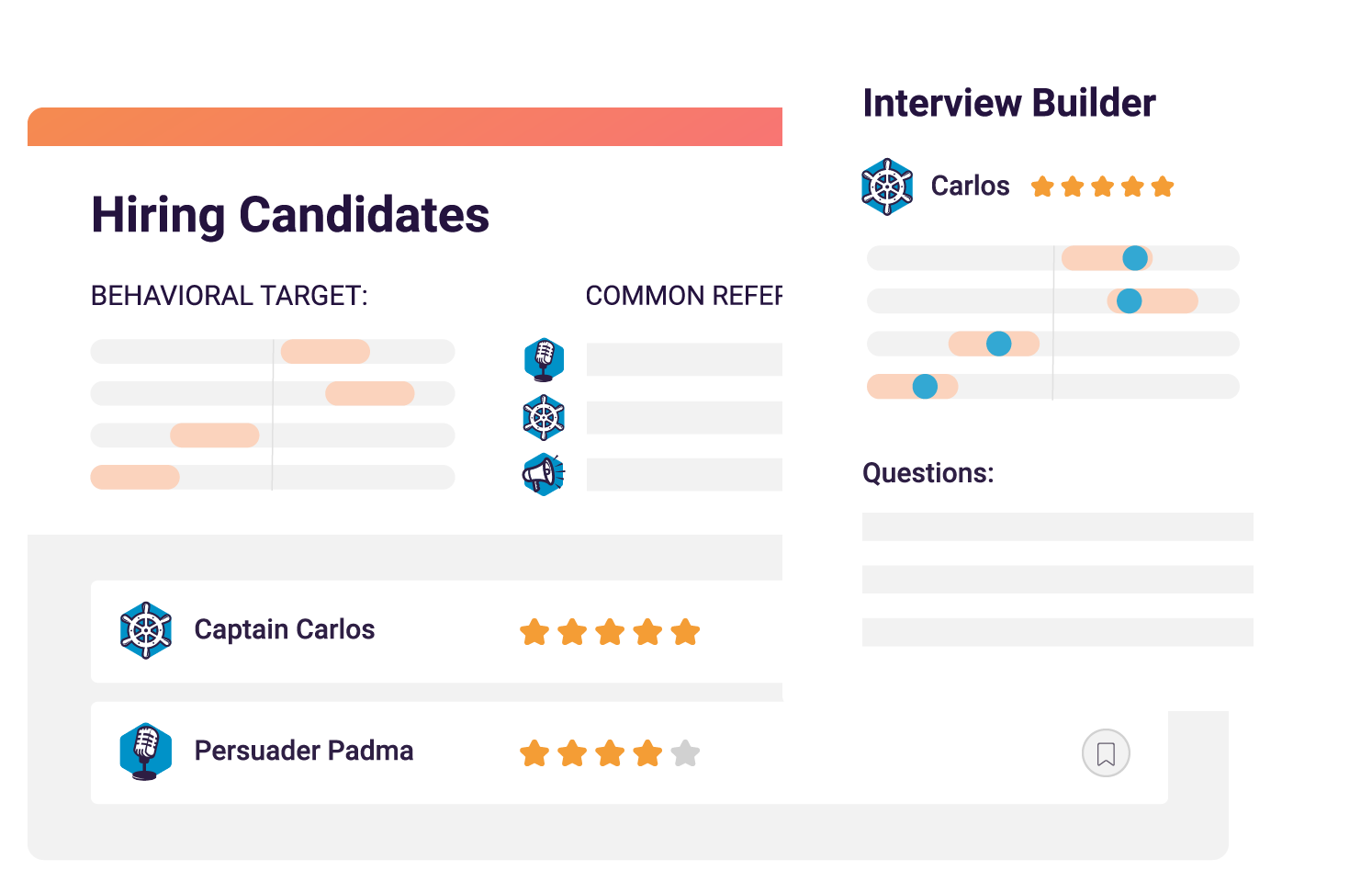Product managers play a key role in technology companies and startups. They’re responsible for the strategy, roadmap, and feature definition of your platform or product line. They also lead the cross-functional teams responsible for improving your product. Such a pivotal role requires an extraordinary hire, so how do you make that excellent hire?
Don’t listen to your gut. While trusting your gut may have served you in the past, it’s not a hiring tool you should be relying on. Here’s why:
Your gut isn’t a good predictor of job success. While resumes and work experience are often used to make hiring decisions, research shows these aren’t the strongest indicators of future job performance. Gut feel doesn’t cut it, either. Good product managers are great at navigating conversations. During the interview process, you might feel completely at ease and believe this person would be a great fit for your product team. But are they strategic in their thinking? Are they good at organizing, prioritizing, and planning? These qualities can’t be predicted by gut feel alone.
A bad hire is costly. Turnover can cost roughly 33% of an employee’s salary, according to Employee Benefit News. Product managers are well-paid professionals. The cost of making a bad hire adds up. In addition to the cost to find, hire, and train a new product manager, your team will be overstretched until a new product manager comes on board.
So, how can you hire product managers who are likely to be high-performing? Here are four ways to start:

1. Define the skills the product manager role requires.
Product managers need a balance of both hard and soft skills. In addition to basic business competency, prioritization skills, and the ability to conduct and analyze research, product managers need to manage stakeholder relationships, influence decision-making, spearhead product development, and innovate.
You’ll also want to hire a product manager who can successfully navigate your business environment and market. Depending on the complexity of your offering or market, you may have additional qualifications of what you’re looking for in a product manager. For example, if you’re building innovative products, you’ll want someone with a flexible approach who’s a big-picture thinker. If you’re building products that have to meet industry regulations, you’ll want someone with a strong drive to conform to rules and structure.
2. Identify the critical behavioral traits you need.
When taking a talent optimization approach to hiring, finding the right behavioral fit is key. Look beyond the resume and include the key behavioral traits required to perform the job well.
Product managers are commonly:
- Collaborative
- Organized
- Empathetic
- Influential
- Creative problem solvers
- Adaptable
At The Predictive Index®, we recommend that hiring managers create a Job Target through a quick assessment survey. Job Targets isolate the behavioral drives and cognitive ability a candidate needs to succeed in a job. This way, all stakeholders are aligned on what type of candidate they’re looking for—before posting the job ad.
Join 10,000 companies solving the most complex people problems with PI.
Hire the right people, inspire their best work, design dream teams, and sustain engagement for the long haul.
3. Use smarter hiring practices to find candidates.
In general, ensuring a candidate is a behavioral and cognitive fit for a role leads to better hires. But with a product manager especially, it’s important to look for culture fit. This person will be working with employees across your organization. It’s important they fit the company culture so they can champion it in their daily work. (Click here to download questions for culture fit.)
To ensure behavioral and cognitive fit, make science a part of your recruiting process.
Our PI Behavioral Assessment™ identifies candidates’ innate behavioral drives. After someone takes the assessment, we assign them one of 17 Reference Profiles. These show us what drives that person’s workplace behaviors and helps ensure job fit.
Our PI Cognitive Assessment™ measures a person’s ability to learn new things. If someone’s cognitive score doesn’t fall within the range you set in your Job Target, they’ll likely struggle to succeed.
4. Address and removing hiring biases.
Even the best hiring managers can fall prey to unconscious bias. Whether it’s gravitating toward a candidate because they’re “like you,” or overlooking another candidate because of something superficial (like a tattoo or piercing), these biases often prevent you from selecting the objective best candidate for the role.
The best product manager may be someone who’s your polar opposite behaviorally. They may dye their hair blue, or come from a background that’s foreign to you. All that matters is that they’re the right fit for the job at hand, and for your company’s culture.
So, how do you cut through the bias? You can reduce subjective bias by incorporating objective science into your hiring process. This includes the use of tools such as behavioral assessments to inform your interview questions, or the use of cognitive assessments to predict on-the-job success. You may also consider other data points as well, from a candidate’s technical background to their relevant years of experience.
Sample interview questions to ask a product manager candidate
Here are some product manager interview questions that can help you land your next great hire:
- Tell me about a time you had to carry out a product vision. Who did you collaborate with, and why?
- Have you ever struggled to implement a new feature? What were the challenges and learnings?
- Can you explain a time you experienced conflict around a product decision? What was the resolution?
- What, in your own words, makes for a successful product? A successful product launch?
3 most common Reference Profiles for product managers
More than 1,700 people have set a Job Target for the product manager role in our software. These are the three most common Reference Profiles they land on.

1. Captain
Much like their moniker, Captains are great at taking charge. They’re confident leaders who love to problem solve, innovate, and learn new things. They’re people-oriented by nature, freely delegating both authority and details. As a result, they’re a natural fit for the product manager role.
2. Venturer
Venturers are direct, factual, and frank. They’re also self-starting, goal-oriented risk-takers. As people who drive change and challenge the status quo, they’re a great match for a product management position.
3. Maverick
Mavericks are outside-the-box, innovative thinkers. They’re quick to act and respond positively to challenges and pressure—qualities that are invaluable in a product management role. As visionaries who leverage relationships to get things done and seek input from various stakeholders in the process, Mavericks make strong product managers.
How to attract top-performing product managers
Here are a few tips for attracting Captains, Venturers, and Mavericks to your open position:
Use the right channels.
Captains and Mavericks are social in nature. And while Venturers may not naturally be as social, their high dominance and visionary tendencies make them formidable networkers. When looking for job opportunities, these candidates are likely at networking events, connecting over LinkedIn, or rubbing elbows with people they know to find their next position. When sourcing candidates with these Reference Profiles, ask your current employees to tap their network and participate in recruiting events to cast the widest net.
Craft the right job listings.
When you’re crafting a job posting, use language that speaks to your ideal candidate. These three Reference Profiles like to be challenged, lead others, and solve problems. Don’t shy away from language that describes the fast pace or complexity of the role—they’re all for it!
Make the right job pitch.
Interviews are a two-way street: Not only are you ensuring the candidate’s a good fit, but they’re considering if your organization is the right next step for them. Captains, Venturers, and Mavericks love a challenge and they like to win. Use the interview to sell them on your company’s vision and position it as a place they want to work.
When selling the role, focus on how they’ll have the opportunity to drive projects, influence others, and move quickly. These are key behavioral needs these candidates are looking to satisfy in a job.
How The Predictive Index helps companies hire top-performing product managers
PI Hire gives you the tools to hire with confidence. Powered by behavioral data, PI packs 65-plus years of science into an intuitive software suite. Use PI to align with stakeholders on your ideal job description, and build a Job Target that assesses how well candidates fit the role. Once you’re equipped with a list of potential candidates, PI helps you with everything from interviewing to hiring—and beyond.
For example: Say you’re looking to hire a great product manager, but don’t know where to start. By delving into PI Hire, you’d learn that effective product managers often exhibit similar behavioral tendencies—innovative thinking, a “break the rules” mentality, and a penchant for risk-taking and problem-solving. The software would then guide you through the creation of a job description and accompanying Job Target, as well as next steps for screening incoming candidates.
Fast-forward to the interview process. You have a list of qualified candidates who meet your behavioral and cognitive benchmarks. PI helps you drill down even deeper, by generating interview questions designed to probe for a candidate’s behavioral strengths and stretch areas. If you have a candidate whose formality drive falls slightly outside the Job Target, for instance, you may pose a question like the following:
Tell me about a time you had to break the rules as part of the product design process. What was the outcome?
By tailoring the interview process to each of your candidates, you up the odds of finding the right match for your organization—and making your next great hire.
Hiring isn’t something you want to leave to guesswork.
Try our free Job Benchmarking Calculator to discover the most common Reference Profiles for any position in your company.
FAQ
Why hire a product manager?
- Gain a product leader who can create, lead, and iterate on a product strategy.
- Strengthen collaboration between product, product marketing, and engineering teams.
- Develop, launch, and test new product features.
- Improve product API integrations with other software tools.
What are the types/variations of the product manager position?
The product manager position is a well-established role. While it’s rare to see a company advertising the role under a different name, you may decide another job title suits the job description better. Here are a few alternatives you may decide to go with:
- Product owner
- Product leader
- Product marketing manager
- User experience designer
- User experience researcher
What skills or experience should an ideal product manager have?
- Project management experience
- Communication skills
- Knowledge of SAAS product lifecycles
- Familiarity with pricing and packaging
- Comfortable working in scrum teams








